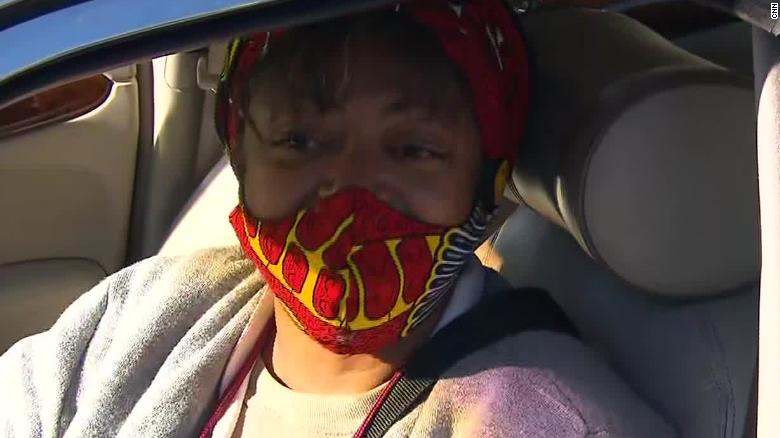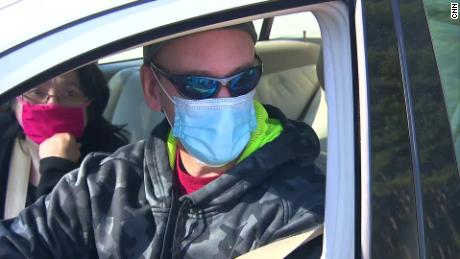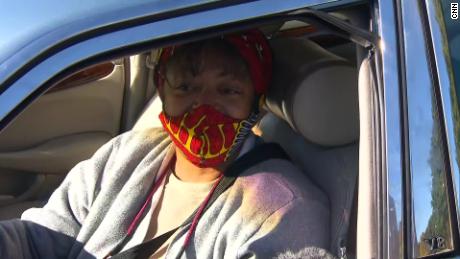(CNN)A monthly food drive in DeKalb County near Atlanta is seeing more and more hungry families in need as Covid-19 has shaken Americans' health and economics.
Delores Rich, who relies on her retirement income, arrived for the food drive at 7 a.m. -- three hours before it began -- to ensure her spot in line.
She said she's had trouble affording groceries during the pandemic. Her favorite things to cook are T-bone steaks and oxtails, but she said every little bit helps.
"Whatever I get, I'll be thankful and blessed for it," she said.
Rich was among 700 people who came to this Dekalb County food drive on Saturday in need of food for themselves and their loved ones. At this and two other locations in the county, a total of 2,500 people received a 20-pound box of fruit and vegetables and a three-pound package of beef, according to the county.
The food drives are a microcosm of the struggling American economy as the Covid-19 pandemic has infected more than 7 million people, killed over 200,000 and upended the lives of all Americans.
Millions of workers who were laid off earlier in the pandemic have returned to work, but many of those temporary layoffs have become permanent as stimulus and a federal unemployment supplement have expired.
In Georgia, 22% of businesses have not reopened as of August, including almost a quarter of all restaurants, 40% of bars, 20% of arts and entertainment and 19% of health and beauty businesses, according to the Georgia Chamber of Commerce.
The pandemic has put particular stress on the nation's food banks. In June, food banks nationwide were serving almost 60% more clients on average compared to last year, according to Feeding America, a network of 200 food banks across the US. About four in 10 are new customers.
Scenes from the food drive
These broader economic struggles could be seen in Dekalb County on Saturday. Michael Thurmond, the Dekalb County CEO, said he hasn't seen this many people show up for a food drive since the pandemic began.
"The number one issue is ... (that) the initial relief, federal relief has run out. People have lost a $600 supplement on their unemployment insurance," he said.
Bill Webber, who builds fences and does housing construction for a living, said his business has been hit hard by the pandemic's economic toll.
"Fewer clients (and) less people planning on doing work that they had planned on," he said. "They cut back and call back and say, 'Hey, we're not going to be able to do this right now.' Which I understood. I'm not upset at people."
He said he had not been to a food drive before the pandemic. He plans to share his box of food with others who were unable to come.
"I know I'm not alone, and I know other people out there -- my whole family has been hit hard," he said.
Tania Larkins similarly said she hadn't been to a food drive prior to the pandemic.
"I feel bad about it, because I never had to do it until the pandemic," Larkins said. "I've always been able to keep food on the table."
She used to work in child care, and her husband drives a school bus part time -- a job now in lower demand with many school districts teaching remotely.
Larkins said she would have wrongly judged these drives in the past.
"I would have judged it like, 'It's for poor people,' or something like that. No, it's not. No, it's not. It's for people in need at this point," she said. "It's very humbling."
Georgia Commissioner of Agriculture Gary Black said that business has been rough for the food bank's suppliers, too.
"We're supplementing the fresh fruits and vegetables with protein, but it's also coming from a local Atlanta business that needed the business," he said.
With Black next to him, Thurmond, the Dekalb County CEO, said the food bank was a bipartisan effort.
"He's a Republican and I'm a Democrat. But hunger doesn't affiliate with any party. I hope you noticed the diversity of the people who came here today. Black folk, White folk, Asian, Hispanic, Latino," he said. "Food insecurity impacts the entire community."









